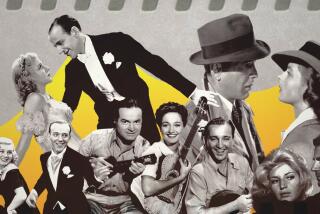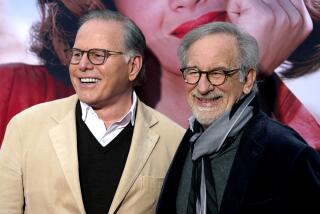When Z marked the spot for film fans
- Share via
In the early ‘80s, Quentin Tarantino was a video store clerk with a passion for movies and a clientele that traded in impossible-to-find foreign and classic films.
When Tarantino found out his customers had recorded them off of the Z Channel, he started a petition drive to get his local cable company to carry the defiantly idiosyncratic channel. Another Z fanatic was born.
Launched in 1974, the primordial days of cable television, and gone before the ‘90s rolled in, Z was a uniquely Los Angeles pay channel that in its 15-year life helped set the template for movie channels to come.
While it wasn’t the first to show movies uncut -- a novelty at the time -- it was the first with a real cineaste’s sensibility. Z was known for championing adventurous films like Bernardo Bertolucci’s “1900” and Karel Reisz’s “Isadora,” helping revive interest in the films of Charlie Chaplin and Buster Keaton and for pioneering the “director’s cut,” most famously with its rehabilitation of Michael Cimino’s flop “Heaven’s Gate.”
But it’s likely that if Z is remembered at all today, it’s for the brutal, tragic end of its creative mastermind, programming chief Jerry Harvey, who killed his wife and then himself as Z was going through its own demise.
The story of Harvey and the channel he ran is the subject of “Z Channel: A Magnificent Obsession,” a new documentary from filmmaker Xan Cassavetes that will be shown tonight at the Los Angeles Film Festival before airing sometime next year on the Independent Film Channel.
“I remember Z as [my] first cable station,” said Cassavetes, who was 9 years old when her parents signed up for it. “Everybody had it and everybody loved it; it played films with bad words and nudity, everything you’d want in a TV station.”
That was a common reaction to premium cable channels in the late ‘70s and early ‘80s. Z launched at a time when the TV norm was “The Million Dollar Movie,” with films routinely trimmed to fit time slots and all nudity and profanity excised.
Even before HBO and Showtime and other premium channels became easily available, Z showed relatively recent films in all their glory, or at least as much glory as was achievable on a 19-inch TV screen. In 1978, two years before Harvey joined the channel, many people credited Z for earning a best picture Oscar for Woody Allen’s “Annie Hall,” which was aired repeatedly on the channel in the weeks before the ceremony.
Still, as Cassavetes’ documentary makes clear, Z really hit its stride when Harvey joined in 1980. Born in Bakersfield into an unhappy home, he soon lost himself in movies. As a student at UCLA in the mid-’70s, he studied film and after graduating took a stab at writing screenplays. Few people saw 1978’s “China 9, Liberty 37,” and he soon landed at SelecTV, an early pay-cable premium channel.
But he found his true calling after moving to the more adventurous Z, where he compiled an eclectic mix of recent hits, foreign-language films and lost classics.
Z “was like a film festival in your house every single night,” filmmaker Henry Jaglom says in “Magnificent Obsession.”
“Jerry perceived his programming as an artistic endeavor, full of all the integrity any great director would have,” Cassavetes said. “People aren’t usually that passionate about a job like programming. Most people would be going into [making] films.”
But, Cassavetes noted, Harvey’s demons that made it difficult for him to work in the collaborative medium of filmmaking were ideal for running a movie channel.
Shortly after he returned to Los Angeles from the Italian shoot of “China 9,” Harvey’s sister committed suicide, sending him into a deep depression.
“He was not going to go out and make films, he stayed in his room watching cable,” Cassavetes said of his first late-night exposure to the then-new idea of cable channels with a film-lover’s sensibility. “His sister dying that way triggered a lot of things. All of his genius and passion was there, and he found the opportunity to live a more reclusive life and fulfill an artistic passion.”
Featuring interviews with filmmakers Robert Altman and Tarantino, actor James Woods and film critic F.X. Feeney, a close friend of Harvey’s, the film pieces together the programmer’s six-year creative high point. Harvey is seen only from photos his first wife Vera Anderson shot, and heard in a radio interview from Feeney’s collection.
Particular attention focuses on how he created the whole notion of a director’s cut of a film with his fanatical efforts to reassemble and rehabilitate “Heaven’s Gate,” the notorious 1980 failure that all but ended Cimino’s career.
Harvey was a fan, and in 1982 he found the one existing print of Cimino’s original cut of the film, which had been heavily edited following a disastrous reception in New York. He aired it with great fanfare, helping restore at least some respectability to the film.
The 46-year-old daughter of actor-filmmaker John Cassavetes and actress Gena Rowlands, Xan Cassavetes cheekily attributes her love of Z to the weeks her parents grounded her for various offenses, time she spent watching the channel.
“I discovered lots of European films, old classics, lost treasures. Getting glimpses into lives of adults was a weird perspective for 13- to 14-year-old girls.”
It was all too good to last for Harvey and for Z. While the channel enjoyed remarkable loyalty, it ultimately couldn’t withstand the competition from HBO, Showtime, the Movie Channel and other, better-funded premium channels. Z changed owners several times and on April 1, 1988, it relaunched as a combination film and sports channel. Eight days later, Harvey shot his third wife, Deri Rudulph, and then turned the gun on himself.
It’s the warring brilliant and tragic sides of Harvey that particularly fascinated Cassavetes. She says she battled with the urge to celebrate his creativity without downplaying the horror of his final act.
“His professor at UCLA said it was like the Ben Franklin notion, where you’re born, have a nice life, succeed and are happy,” Cassavetes said. “That’s the American recipe for happiness. Jerry’s life is a bit more real than that. I thought it was interesting to see a case study of how that happened.”
More to Read
The biggest entertainment stories
Get our big stories about Hollywood, film, television, music, arts, culture and more right in your inbox as soon as they publish.
You may occasionally receive promotional content from the Los Angeles Times.










